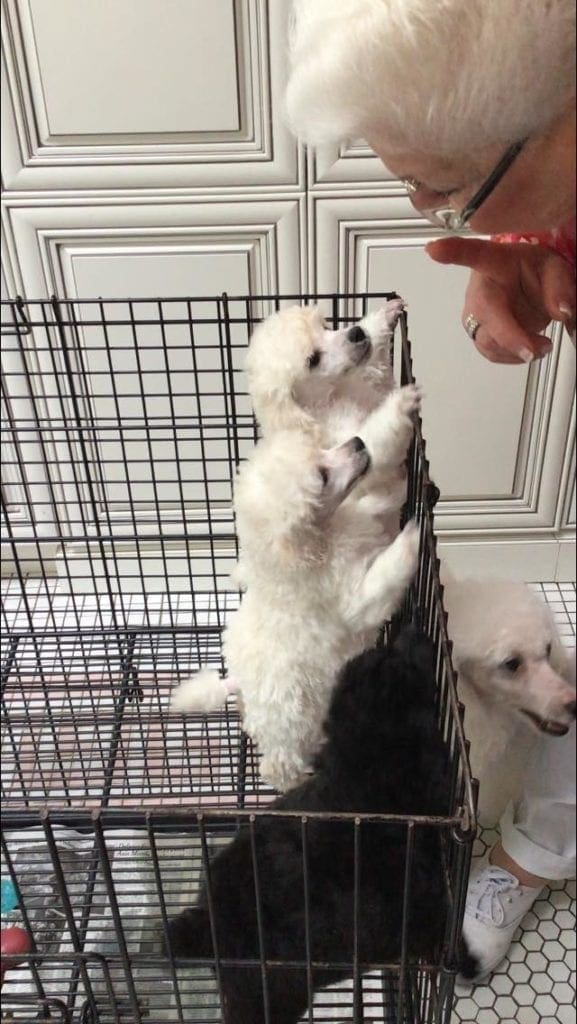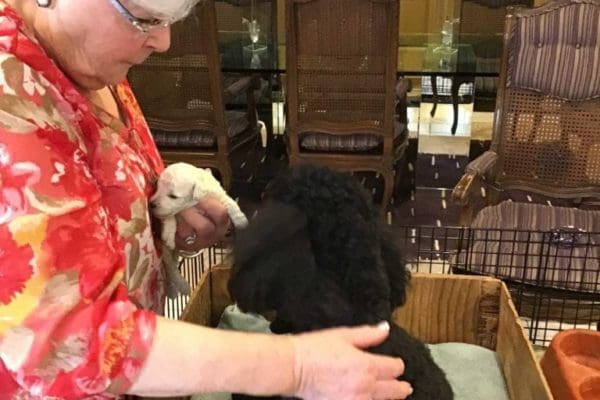Staten Island, NY – Miniature poodle breeder Joan Markowitz makes her home easy to spot from the street by adorning the entrance with two poodle statues. There is an audible bark emanating from the walls inside the home belonging to “Reba,” Markowitz’s eight-year-old white miniature poodle whom she breeds and shows.
“They make me happy,” the American Kennel Club Breeder of Merit told The Canine Review on a sunny afternoon in August. “They give me headaches sometimes, but they make me happy.”
Markowitz has been breeding black and white miniature poodles for about forty years. It started in 1973 when Markowitz’s children were teenagers, and she bought a white miniature poodle named “Pom Pom.”
“I didn’t know then that this was going to be my whole life. She was just supposed to be my pet,” Markowitz says.
Today, Markowitz is almost 80 years old and a full-time breeder of miniature poodles for her breeding company, Light N’ Lively (or “LNL”) Miniature Poodles.
When she attended her first Westminster Kennel Club dog show and saw another miniature poodle to whom she wanted to breed Pom Pom, that pairing would produce her first successful show dog. “I was hooked, absolutely hooked,” she continued. Over her career, Markowitz says she has bred 35 AKC champions.
When The Canine Review visited in August, there was a litter of eight two-week-old puppies with their mother, “Whoopie”, squirming in a whelping box inside of a puppy pen. In the kitchen was “Reba’s” most recent litter of three eight-week-old puppies.

Her poodles are bred for health, temperament, “and all the rest of the traits that I’m looking for come after that..”
In the kitchen, as Markowitz prepares food for the puppies, mixing yogurt, half and half, and rice cereal with kibble, she reminisces about the changes she has observed in the breeding world, most importantly with the introduction of genetic testing.
LNL Poodle Policies and Process
Rather than requiring buyers to complete a questionnaire, Markowitz insists on talking by phone or in-person before approving them to purchase one of her puppies. If they live in the area, they can come and observe the puppies and note any preferences if they are drawn to any, but generally, Markowitz says she picks the puppies for her customers.
Markowitz says she keeps a maximum of ten dogs in her home at a time and produces four litters each year: Two in the spring and two in the fall. Her two actively breeding dogs get a break between litters therefore, are not typically bred more than once per year.
However, Markowitz said in an email “If it is an important bitch in my breeding program and if the male that I want to breed to is getting old or even if she is getting older I will breed her twice in one year but then she must be rested for at least a full year after that. It might happen twice in her breeding life.”
Puppies are born and raised in Markowitz’s kitchen and living room which facilitates a high degree of socialization from birth, Markowitz explains. Markowitz handles the puppies, as well as a kennel assistant who comes twice a day to feed the puppies. Markowitz’s adult daughter bathes them.
Markowitz told The Canine Review that she will ship puppies overseas and within the United States; however, she will not ship puppies unaccompanied beyond Canada.
LNL Poodle Health Testing and Guarantees
Markowitz says she tests all adult dogs in her breeding program for progressive rod-cone degeneration, dwarfism; and her veterinarian screens all hips, elbows, knees, hearts, and general health. Asked about certifications, if any, she provides to buyers, Markowitz said: “You don’t have to test on every single dog you’ve ever bred, but you have to do it on a lot of them,” she says, adding that not every dog she breeds is OFA (Orthopedic Foundation for Animals) clear. “In some cases, if the dog is younger than 2 years old and cannot be officially graded I will rely on my own veterinarian’s findings,” she told The Canine Review in an email.
LNL puppies are dewormed, microchipped, and receive distemper/parainfluenza vaccines as well as five-in-one DHPP combination puppy vaccines before they go to their new homes.
All puppies are examined by Markowitz’s veterinarian and come with a health certificate stating his findings. Markowitz also sends puppies to their new homes with a supply of their current food to keep things as stress-free as possible as the puppies transition to their new homes.
The new owners receive American Kennel Club papers, health records, and a health certificate from Markowitz’s veterinarian. However, Markowitz asks that the new owners take their puppy to their own veterinarian within three or four days of pick-up. If the examination finds anything of concern, Markowitz says she will refund or replace the puppy — although she has never yet had to do so.
The dogs are not fixed, but they come with limited registration, which means that they cannot be bred and have their puppies registered. “If I think that someone is interested in breeding my dogs, they’re not getting them,” she says. The dogs don’t receive the Leptospirosis vaccination because, she says, her line is allergic to the vaccine.
Markowitz often boards and grooms puppies she has raised and will always take a dog back from a buyer for any reason.
When a client passed on a few months ago and left behind an eight-year-old miniature poodle from one of her litters, Markowitz says she helped find that dog a new family. “You brought them into the world, you need to watch what happens to them,” she says of her puppies.

